
A. S. Byatt
The following novels constitute the shortlist for the 1990 Booker Prize:
Notable Omissions from the 1990 Shortlist

|
Possession A. S. Byatt |
Dustjacket synopsis:
"A.S. Byatt has earned a unique reputation as a novelist who manages to combine passion and intellect, and the life
of the emotions with that of the mind; and these qualities are shown at their triumphant best in
Possession, a tour de force of wit and intelligence, romance and scholarship.
Like The French Lieutenant's Woman, it is formally both a modern novel and a high
Victorian novel. Two young academics are researching into the lives of - respectively - the
Browningesque mid-Victorian poet Randolph Henry Ash and his contemporary, Christabel LaMotte;
and as they delve deeper into the turbulent and hitherto unrelated lives of the two poets
through their letters, journals and poems, and trace their movements from London to the north
Yorkshire coast, from spitiualist seances to the fairy-haunted far west of Brittany, a bizarre
and haunting counterpointing and correspondence of passions and ideals begins to emerge. An
astonishingly rich and exhilarating blend of mystery, romance, comedy, Victoriana and modern
university novel - it reaches its climax on a storm-tossed night in the churchyard where Ash and
his secret are buried - Possession is A.S. Byatt's finest and most ambitious novel yet."
First Paragraph:
These things were there. The garden and the tree
The serpent at its root, the fruit of gold
The woman in the shadow of the boughs
The running water and the grassy space.
They are and were there. At the old world's rim,
In the Hesperidean grove, the fruit
Glowed golden on eternal boughs, and there
The dragon Ladon crisped his jewelled crest
Scraped a gold claw and sharped a silver tooth
And dozed and waited through eternity
Until the tricksy hero Herakles
Came to his dispossesion and the theft.
Randolph Henry Ash, from
The Garden of Prosperina, 1861
The book was thick and black and covered with dust. Its boards were bowed and creaking; it had been maltreated in its time. Its spine was missing, or rather protruded from amongst the leaves like a bulky marker. It was bandaged about and about with dirty white tape, tied in a neat bow. The librarian handed it to Roland Michell, who was sitting waiting for it in the Reading Room of the London Library. It had been exhumed from Locked Safe No. 5 where it usually stood between Pranks of Priapus and The Grecian Way of Love. It was ten in the morning, one day in September 1986. Roland had the small single table he liked best, behind a square pillar, with the clock over the fireplace nevertheless in full view. To his right was a high sunny window, through which you could see the high green leaves of St James's Square.
From the Chatto & Windus hardback edition, 1990.
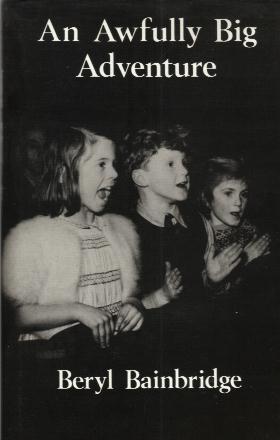
|
An Awfully Big Adventure Beryl Bainbridge |
Dustjacket synopsis:
"It is 1950 and the Liverpool repertory theatre company is rehearsing its Christmas production of
Peter Pan. 'I don't want any truck with symbolic interpretations.' Meredith tells his
actors. 'As far as I'm concerned it's all pure fantasy.' O'Hara, who has come down from
London to play Captain Hook, is relieved to hear it.
"But then neither Meredith nor O'Hara has taken into account the disturbing presence of Stella, the young Liverpool girl who has been hired as assistant stage manager. It is Stella, babbling of night lights in the nursery, of lost mothers and the ticking of clocks, who begins to revive an entirely different drama in which O'Hara is doomed to play the lead."
First Paragraph:
When the fire curtain had been lowered and the doors were at last closed, Meredith thought he heard a child crying. He switched on the house lights, but of course there was no one there. some unfortunate had left a teddy-bear perched on the tip-up seat in the third row.
The girl was waiting for him in the property room. At his approach she stepped backwards, as though afraid he would strike her. He didn't look at her; he simply told her, in that particular tone of voice which in the past he had always used for other people, that he wasn't interested in excuses and that in any case there were none that would fit the bill.
From the Duckworth hardback edition, 1990.
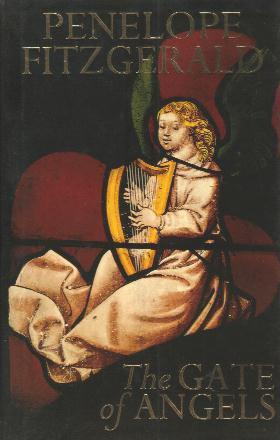
|
The Gate of Angels Penelope Fitzgerald |
Dustjacket synopsis:
"In 1912 Fred Fairly is a Junior Fellow at the college of St Angelicus in Cambridge, where
for centuries no female has been allowed to set foot. He lectures in physics and the
questionable nature of matter, and worries about the universal problem known in Cambridge at the
time as 'the absurdity of the Mind-Body relationship'. To Fred this is tormenting rather than
absurd. The young woman beside him when he wakes up one evening in the Wrayburns' spare
bedroom might help to resolve it, but how can he tell if she is quite what she seems? Fred is a
scientist. To him the truth should be everything, and indeed he thinks it is. But scientists
make mistakes.
"'She is the mistress of the hint of the sublime', said The Times reviewing Penelope Fitzgerald's previous novel, The Beginning of Spring. Her readers will recognise that here is a story to call forth her extraordinary gifts. The Gate of Angels is every bit as enjoyable, as funny, as well constructed and as beautifully written as any of its predecessors. It is, perhaps, even more concentrated, and what another critic called 'the sense of understanding gained at the last second' is even more acute. 'Now tell me,' the Master of Fred's college asks him, 'have you made up your mind on the most important question of all?' The answers Penelope Fitzgerald gives, in the most sublime of all her novels, can only be compared to the effect of music."
First Paragraph:
How could the wind be so strong, so far inland, that cyclists coming into the town in the late afternoon looked more like sailors in peril? This was on the way into Cambridge, up Mill Road past the cemetery and the workhouse. On the open ground to the left the willow-trees had been blown, driven and cracked until their branches gave way and lay about the drenched grass, jerking compulsively and trailing catarcats of twigs. The cows had gone mad, tossing up the silvery weeping leaves which were suddenly, quite contrary to all their experience, everywhere within reach. Their horns were festooned with willow boughs. Not being able to see properly, they tripped and fell. two or three of them were wallowing on their backs, idiotically, exhibiting vast pale bellies intended by bnature to be always hidden. They were still munching. A scene of disorder, tree-tops on the earth, legs in the air, in a university city devoted to logic and reason.
From the Collins hardback edition, 1990.
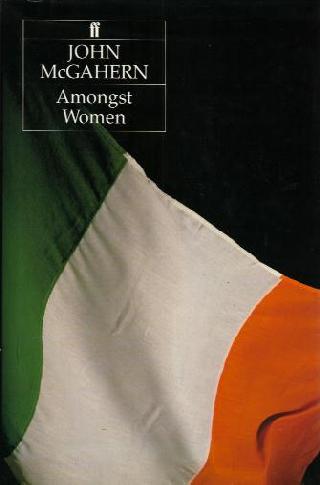
|
Amongst Women John McGahern |
Dustjacket synopsis:
"Moran is an old Republican whose life was forever transformed by his days of glory as a
guerilla leader in the War of Independence.
"Now, in old age, living out in the country, Moran is still fighting - with his family, his friends, even himself - in a poignant struggle to come to terms with the past.
"Above all, it is his life amongst women, his relationship with his second wife, Rose, and his three daughters, that lies at the heart of Moran's predicament: the complex challenge of love and fear, of self and other people.
"Amongst Women is a brilliant and moving novel, and one that confirms John McGahern's claim to be Ireland's leading writer of prose fiction."
First Paragraph:
As he weakened, Moran became afraid of his daughters. This once powerful man was so implanted in their lives that they had never left Great Meadow, in spite of jobs and marriages and children and houses of their own in Dublin and London. Now they could not let him slip away.
'You'll have to shape up, Daddy. You can't go on like this. You're giving us no help. We can't get you better by ourselves.'
'Who cares? Who cares anyhow?'
'We care. We all care very much.'
They all came at Christmas. After Christmas, Mona, the one girl who had not got married, came every weekend from Dublin. Sometimes Shiela got away from her family to come with her and she drove down for a few hours as well as now and again in the middle of the week. The air fare from London was too expensive for Maggie to come regularly. Michael, their younger brother, had promised to come from London at Easter but Luke, the eldest, still would not come. All three girls planned to come to revive Monaghan Day. They had to explain to their stepmother Rose what Monaghan Day was. She had never heard of it in all her time in the house.
From the Faber & Faber hardback edition, 1990.
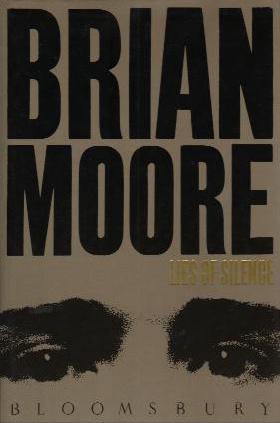
|
Lies of Silence Brian Moore |
Dustjacket synopsis:
"'My unconscious method is to find the moment of crisis.' - Brian Moore
"For Michael Dillon the moment comes just as he is making a decision which he expects to bring him the greatest happiness he's ever known. An ordinary man trying to get on with his life, he now finds himself suddenly on the edge, faced with a moral choice which leaves him absolutely nowhere to turn. The expectation of happiness is replaced by a nightmare maze of dead ends. Brian Moore's new novel addresses the starkest questions of right and wrong, and the skeins of plot are tightened to a pitch of suspense that leaves the reader breathless. To say that it is his best yet is praise of a hyperbolic order, yet this is the culmination of an extraordinarily fertile career. And it is, all too crucially, a book for our times."
First Paragraph:
At a quarter to nine, just before going off work, Dillon went down to reception to check the staff roster for tomorrow. Two of the six women who came in to make breakfasts were reporting sick, so room service would be short staffed in the morning. he told Eileen, the clerk on the front desk, to ask Duffy to ring around and see if he could find replacements. But it would be a wasted exercise. He then went down the hall and had a word with Collis, the banquet manager.
'Bloody hell,' Collis said. 'I'm no help to you. Wouldn't you know it would happen on a day when we have two breakfast functions and one of them's for eighty people.'
From the Bloomsbury hardback edition, 1990.
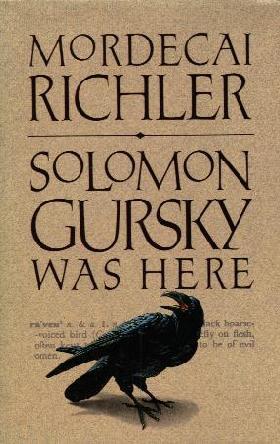
|
Solomon Gursky was Here Mordecai Richler |
Dustjacket synopsis:
"With his first novel for ten years, the author of St Urbain's Horseman has written his
most ambitious and unforgettable novel yet.
"From a family of bootleggers turned legitimate, Solomon Gursky chose a very different path from that of his brothers, Bernard, the rambunctious business man, and Morrie the weak-willed mediator. When Moses Berger, writer, salmon-fisher, and part-time drunk, decides for his own characteristically perverse reasons to write a history of the Gursky family, he becomes obsessed with the ubiquitous but evasive Solomon.
"Dismantling the facade which the Gurskys have built around themselves, Moses discovers Solomon's grandfather Ephraim, equally elusive and even more of a rogue - a forger and Arctic explorer, cabin boy to Franklin's ill-fated expedition to find the Northwest Passage; a self-styled rabbi, a charmer and seducer. As he shadows the family from the stews of Victorian London via the port of Stromness in the Orkneys to the frozen wastes of Canada where Eskimos practise improbable Judaic rites, and from Canada's stock market to the fleshpots of London and Oxford, Moses finds himself hooked on a line of his own making - in pursuit of a man who finds living once confining.
"Mordecai Richler's irresistibly iconoclastic re-creation of Arctic, Jewish, financial and alcoholic history comes to glorious, inimitable life at the hands of the most enagaging rogue, heroes and heroines we are ever likely to meet. Rich and irreverent, exuberant and sombre by turns, Solomon Gursky Was Here shows Richler at the top of his dazzling form."
First Paragraph:
One morning - during the record cold spell of 1851 - a big menacing black bird, the likes of which had never been seen before, soared over the crude mill town of Magog, hard by the Vermont border, swooping low again and again. Luther Hollis brought down the bird with his Springfield. Then the men saw a team of twelve yapping dogs emerging out of the wind and swirling snows of Lake Memphremagog. The dogs were pulling a long, heavily laden sled at the stern of which stood Ephraim Gursky, a small fierce hooded man cracking a whip. Ephraim pulled close to the shore and began to trudge up and down, searching the skies, an inhuman call, some sort of sad clacking noise, at once abandoned and yet charged with hope, coming from the back of his throat.
From the Chatto & Windus hardback edition, 1990.
Notable Omissions from the Shortlist:
"Age of Iron", J.M. Coetzee
"The Snapper", Roddy Doyle
"My Son's Story", Nadine Gordimer
"Three Times Table", Sara Maitland
"The Great World", David Malouf
"Hopeful Monsters", Nicholas Mosley (winner Best Novel and Book of the Year at the
1990 Whitbread Awards)
"The Buddha of Suburbia", Hanif Kureishi (winner Best First Novel at the 1990 Whitbread
Awards)
This page and its contents are copyright © 2002-05 by Perry Middlemiss, Melbourne, Victoria, Australia.
Last modified: August 17, 2005.